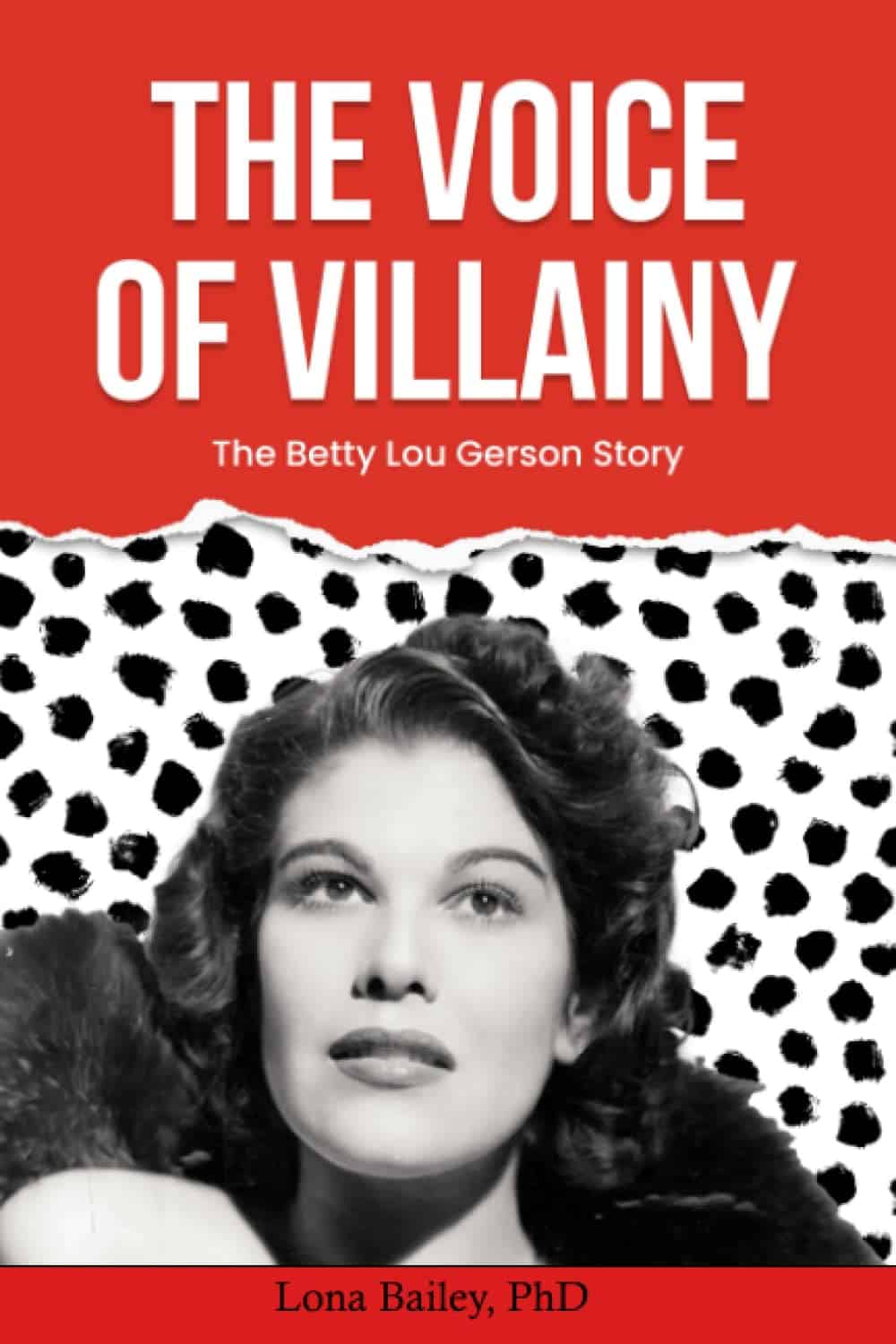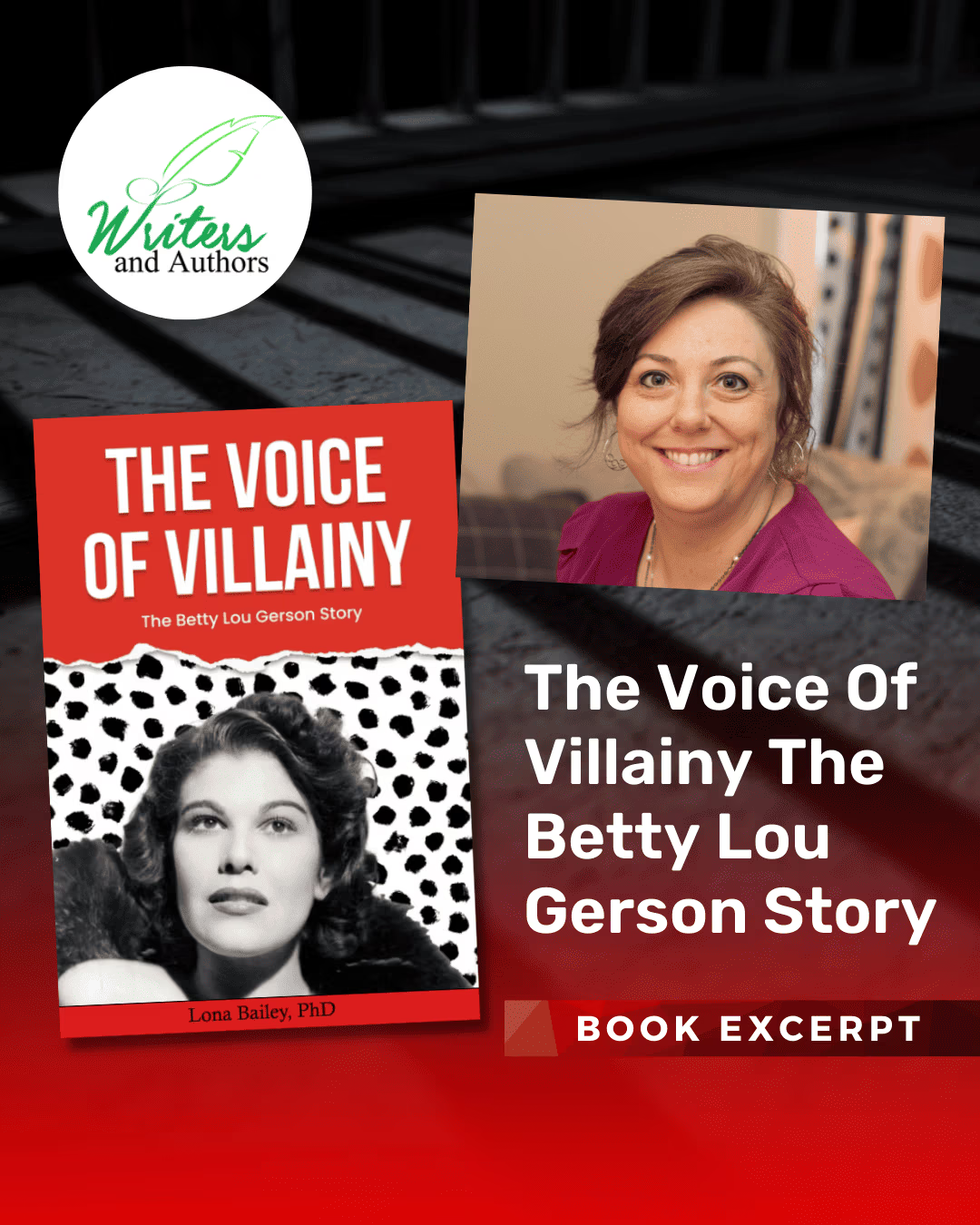Book Excerpt from The Voice of Villainy The Betty Lou Gerson Story
Author’s Note
She was a three-pronged paragon, but only 5’2. She gave our world so much through her femininity, creativity, and agility, but on the surface, she was just damn good at sounding “really mean.”
 In many ways, Betty Lou Gerson was far ahead of her time in her candid approach to life. As a pioneer in America’s early entertainment industry, she helped lay the cornerstones of today’s multifaceted industry that spans all mediums. She suffered many personal tragedies in her eighty-four years, yet gracefully overcame them. She traversed through some of the most volatile eras in American history, and continuously evolved with the times, which isn’t always an easy thing to do. She lived through two world wars, Red Scares, the myth of the Deep South, civil rights, and nearly outlived her entire family of origin. She was among twentieth century pioneers in stage, radio, and television and perhaps most notably rose to global acclaim as the voice of villainess “Cruella de Vil” in Disney’s animated film One Hundred and One Dalmatians (1961). She lived a fascinating life that still holds countless secrets. It has been an honor to “get to know her” in writing her biography, and I hope her contribution to our world will continue to live in her earthly absence.
In many ways, Betty Lou Gerson was far ahead of her time in her candid approach to life. As a pioneer in America’s early entertainment industry, she helped lay the cornerstones of today’s multifaceted industry that spans all mediums. She suffered many personal tragedies in her eighty-four years, yet gracefully overcame them. She traversed through some of the most volatile eras in American history, and continuously evolved with the times, which isn’t always an easy thing to do. She lived through two world wars, Red Scares, the myth of the Deep South, civil rights, and nearly outlived her entire family of origin. She was among twentieth century pioneers in stage, radio, and television and perhaps most notably rose to global acclaim as the voice of villainess “Cruella de Vil” in Disney’s animated film One Hundred and One Dalmatians (1961). She lived a fascinating life that still holds countless secrets. It has been an honor to “get to know her” in writing her biography, and I hope her contribution to our world will continue to live in her earthly absence.
This is a chronicle of research, but as a caveat to readers, Betty Lou Gerson was and is so much more than any book could relay (as all biographic subjects are). While humanity can be better understood through historic preservation, people themselves are much more than collections of facts, records, and personal accounts. In this book, I hope never to attempt to speak for Betty, but to simply introduce you to her in a way that allows you to better hear her husky voice for yourself. I’m merely turning up the volume on a compelling story that has many elements of connection, inspiration, and grit from which we all can learn.
This work is published after months and months of sifting through historical records, recorded interviews, newspaper articles, and radio recordings in tandem with countless interviews, phone calls, emails, texts, and snail mail exchanges that helped bring the research points into technicolor. While the research presented in these pages has been carefully conducted and compiled with the utmost intentionality, gaps are present and due to the nature of the historical accounts collected and presented, the entirety of any story can never be shared. I hope you will view this as a showcase of several significant portions of Betty’s life that have contributed toward the legacy she has left behind, and perhaps consider your own in a new way. The majority of the content in quotations throughout this book has come directly from either recorded or printed interviews with quotations indicating secondary sources – some listed and some unlisted.
This biography is part record and part experience, as all humanity is. It includes primary and secondary data along with the unique interpretation of the researcher and writer herself. The facts and experiential content found in the following pages are accurate in so much as any historical account can be. There are some discrepancies on certain records and dates, but those are generally detailed on a case-by-case basis. The experiential accounts presented by individuals mentioned in this book have been contributed of their own free will based on their own personal recollections and experiences. While many of her works are detailed in the pages hereafter, no exhaustive list of her complete works in any media exists.
As a researcher and writer, I approach this biography with three glaring personal biases that should be mentioned straightaway: First, I never had the privilege of meeting the star of this bio; therefore, I have researched and written from behind a glass, so-to-speak. Second, I am removed from the historical context by a couple of generations; therefore, my postmodern worldview will undoubtedly be evident throughout this work. This is significant in that my worldview as a researcher and writer is an indirect byproduct of the eras I have studied and shared about in the following pages. Third, I am a fan of Betty Lou Gerson’s, and my interpretation of her career and life will certainly be based on my overall favorable opinion of her and her contribution to our world. Not all biases are negative, though they should be acknowledged in any effort to share information in an ethical and veracious way.
Some of the contextual information found in this biography may be obvious or even painfully boring to some, leaving readers asking, “What the devil does this have to do with Betty Lou?” but in an effort to preserve and further the particular segment of history of which she was a part, I believe it is important to detail as much context as possible for generations, like my own, who may be unaware of some of the era-related implications that make her story so interesting.
Perhaps most importantly, a very special thanks to all who made this biography possible. Thank you to all those who have been so kind to contribute their time, memories, and support to this project. I have been so fortunate to connect with many remarkable individuals whose journeys intersected with Betty Lou Gerson in unforgettable ways. Empirical research is so important in any project of this nature, but the ways in which we touch each other’s lives is truly how “biography” is created. One of the most rewarding elements of researching and writing this book has been connecting with family members, friends, and colleagues of Betty’s who have been so generous to share their stories with me. A very special thanks to Betty’s family for their support of this writing project and for sharing the lovely memories.
Thank you to all the stellar people at SPERDVAC who not only personally directed me to many archive interviews and recordings with and about Betty, but for being instrumental in creating these archive interviews and recordings in the first place. The grand efforts of organizations like SPERDVAC are so important for later generations, of which I am a part, to experience a bit of time travel through the voices and the stories of previous eras. Without SPERDVAC’s vigilant efforts in capturing pieces of history through interviews and recordings, the beautiful, hilarious, and heartbreaking stories (many of which you will find in this book) would have been lost forever. While I so appreciate SPERDVAC as a whole, I also want to specifically name a few people within the entity who have been especially impactful in the creation of this book: Larry Gassman, Walden Hughes, and John Tefteller.
A special thanks to the Pacific Pioneer Broadcasters (PPB) for their archiving efforts of Les Tremayne’s private recordings. A special thanks to David Seubert at the University of California, Santa Barbara for his unyielding perseverance in locating the lost archive of those recordings. If not for John Tefteller’s tip, and David Seubert’s efforts, the wonderful interview by Alice Backes with Betty Lou Gerson for the PPB would have been forever lost in dusty warehouse storage.
A special thanks to all the wonderful old time radio researchers who helped guide my own research in this project. Without the preservation work of so many researchers before me, this biography would have been incredibly difficult if not impossible to write. Thank you, John Dunning for your incredible work Tune in Yesterday: The Ultimate Encyclopedia of Old Time Radio 1925-1976; J. David Goldin’s RadioGOLDINdex; OldTimeRadioDownloads.com; Jerry Haendiges Vintage Radio Logs; RUSC Old Time Radio; Ivan G. Shreve, Jr.; and The Digital Deli. Your work is invaluable, and I am ever grateful for your efforts to preserve this wonderful history of the Golden Age of radio.
A special thanks to Chuck Schaden for his preservation work in creating recordings of so many interviews with legendary artists like Betty, and for making them available to others. A special thanks to those wonderfully talented colleagues of Betty’s who were so kind in sharing their memories with me such as Karen Dotrice and Joyce Meadows.
To everyone mentioned above, thank you all for being so patient with my nosiness and excavation efforts in gathering all the information I could about one of our favorite voices in media history. It has been a great pleasure partnering with you in these research efforts. Thank you for allowing history to live on through your intimate contributions!
– Dr. Lona Bailey
The Betty Lou Gerson Story – Nonfiction
She voiced one of Disney’s most infamous villainesses. With her husky timbre and most unforgettable cackle, Betty Lou Gerson terrified an entire generation as Disney’s original “Cruella de Vil” in One Hundred and One Dalmatians (1961). Betty used her whiskey-soaked voice to give us an innovative portrait of elegant villainy beyond entertainment’s stereotypical “old hag” antagonists in radio, film, and television. She had a prolific radio career in both Chicago and Hollywood before the silver screen and was featured in many popular television series in the 1950s and 1960s such as Perry Mason, The Dick Van Dyke Show, and Hazel. Though “Cruella” is perhaps her most recognized role, she also performed in other beloved film classics including Cinderella (1950), Mary Poppins (1964), and Cats Don’t Dance (1997).
The great irony of Betty’s story is that while her voice frightened audiences through nearly all mediums, off-mic, she was in fact no villainess at all. Betty traversed through some of the most volatile eras in American history, while overcoming many personal tragedies of her own. She was among twentieth-century entertainment pioneers and an iconic voice of feminism.
Learn the compelling story of Betty Lou Gerson as the “voice of villainy.” BUY NOW on AMAZON
About the Author
Lona Bailey is a Golden Age of Hollywood researcher and writer of “Uncredited: The Life and Career of Actress Virginia Gregg” and
“The Voice of Villainy: The Betty Lou Gerson Story.”
As a Ph.D. and former therapist, Lona is passionate about telling the untold #storiesofwomen those who perhaps weren’t finished using their own voices during their earthly journeys. Lona is a mother of three with a balanced perspective on the multidimensional elements involved in legacy maintenance with a particular interest in the preservation efforts of the #GoldenAgeofHollywood. Lona’s #biographic works are delicately
researched and written with a candid and fair pen and plenty of room for levity.
#OldHollywood holds millions of secrets in its gothic #sensationalism; with its #darksecrets, come just as many shimmering triumphs– and Old Hollywood wouldn’t be as we know it without both.
Contact Link
Purchase Link





















